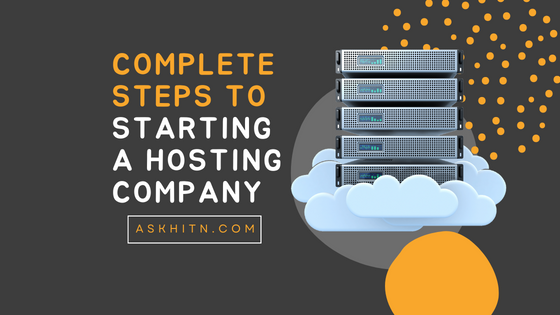Starting a hosting company can seem like an intimidating endeavor. It’s a big undertaking that requires an array of technical expertise and business savvy. But the truth is, with enough research, planning, and dedication, anyone can start their own web hosting business. You don’t have to be some sort of tech genius—all you need are the right resources and know-how. In this blog post, we’ll provide you with all the information you need to get started in your hosting business journey. We’ll discuss the steps necessary for starting a successful hosting company and provide tips to help ensure your success. Read on for everything you need to know about launching your own web hosting business!
Define your hosting services
When you start a hosting company, you will need to define your hosting services. This means deciding what types of hosting services you will offer and how you will price them.
There are many different types of hosting services, but the most common are shared hosting, VPS hosting, dedicated server hosting, and cloud hosting. Shared hosting is the most basic and affordable type of hosting, while dedicated servers are the most expensive. VPS and cloud hosting fall somewhere in between.
Once you have decided what types of hosting services you want to offer, you need to set your prices. Pricing can be based on a variety of factors, such as the amount of storage space and bandwidth included, the level of customer support provided, or the features offered.
In general, it is best to start out with lower prices and then gradually increase them as your company grows. This will help you attract more customers and build a solid reputation in the industry.
Research the hosting market
Before you start your hosting company, you need to do your research. This includes investigating the hosting market and understanding what potential customers are looking for.
The first step is to understand the different types of hosting services that are available. This will help you determine what type of hosting company you want to start. There are four main types of hosting services: shared, virtual private server (VPS), dedicated, and cloud.
Shared hosting is the most basic type of service, where your website shares a server with other websites. This is the most affordable option but it also has the least amount of control over your server environment.
Virtual private servers (VPS) provide more control than shared hosting, as each website has its own virtual server. However, VPS plans can still be quite expensive and may not be necessary for small websites.
Dedicated servers are only used by one website and offer the highest level of control and performance. However, they are also the most expensive option.
Cloud hosting is a newer type of service that uses a network of servers to power your website. It is scalable and flexible, making it a good option for growing websites.
Once you understand the different types of hosting services, you need to research the specific market that you want to target. Identify your target audience and learn about their specific needs when it comes to hosting services. For example, if you want to target small businesses, find out what their specific
Create a business plan
When starting a hosting company, the first step is to create a business plan. This document will outline your company’s goals, strategies, and how you plan on achieving them. It is important to have a solid business plan in place before moving forward with starting your hosting company.
There are a few key elements that should be included in your business plan:
1. Executive Summary: This section should give a brief overview of your company, including your mission statement and what you hope to achieve.
2. Company Description: Here you will describe what services you will offer and how your company will be structured.
3. Market Analysis: In this section you will need to research the hosting market and identify your target audience. You will need to know who your competition is and what their strengths and weaknesses are.
4. Marketing Plan: Your marketing plan should detail how you intend on promoting your hosting company and acquiring customers.
5. Financial Plan: This section of your business plan will outline your startup costs and projected income. It is important to have a realistic financial plan in place before starting your hosting company.
Choose your business structure
There are several business structures to choose from when starting a hosting company. The most common are sole proprietorships, partnerships, limited liability companies (LLCs), and corporations.
Sole proprietorships are the simplest business structure and can be run by one person. This type of business has unlimited liability, meaning the owner is personally responsible for all debts and losses incurred by the business.
Partnerships are similar to sole proprietorships but have two or more owners. Like sole proprietorships, partnerships have unlimited liability, meaning the partners are personally responsible for all debts and losses incurred by the business.
Limited liability companies (LLCs) offer some protection from personal liability for shareholders. This means that shareholders are not personally responsible for debts and losses incurred by the business. LLCs can be owned by one person or by multiple people.
Corporations offer the most protection from personal liability for shareholders. Shareholders are not personally responsible for debts and losses incurred by the business. Corporations can be owned by one person or by multiple people.
Register your hosting business
Assuming you would like content for a subheading titled “Register your hosting business”:
There are a few key steps you need to take in order to register your hosting business. First, you need to choose a business structure and obtain the necessary licenses and permits. Next, you need to open a business bank account and get insurance for your company. Finally, you need to register your business with the IRS and your state’s tax agency. By following these steps, you can ensure that your hosting business is properly registered and ready to start operating.
Get a tax identification number
If you’re starting a hosting company, you’ll need to get a tax identification number (TIN). This is a unique nine-digit number assigned by the IRS to businesses for tax purposes.
To get a TIN, you’ll need to fill out an application and submit it to the IRS. The application, Form SS-4, is available on the IRS website.
Once you have your TIN, you’ll need to use it when filing your taxes. You’ll also need to provide it to your customers if they want to deduct any charges paid to your hosting company on their own taxes.
Open a business bank account
When you’re ready to start your hosting company, one of the first things you’ll need to do is open a business bank account. This will help you keep your personal and business finances separate, and will make it easier to track your expenses and income.
There are a few different options for business banking, so take some time to research what’s available in your area. Once you’ve found a few banks that meet your needs, open an account with the one that offers the best terms.
Be sure to ask about any fees associated with opening and maintaining a business bank account. Some banks charge monthly or annual fees, while others may have transaction-based charges. Find out what all of the charges are before you commit to an account so that you can budget accordingly.
Set up accounting software
There are a number of accounting software programs available, so it is important to do some research to find the one that will work best for your hosting company. Once you have selected the software program you want to use, you will need to set up your account and input all of your company’s financial information. This can be a time-consuming task, but it is important to get everything set up correctly from the start.
Secure funding for your hosting company
Assuming you have a business plan and you’re ready to take your hosting company to the next level, you’ll need to start thinking about how to secure funding. Here are a few avenues you can explore:
1. Small business loans: There are many organizations and banks that offer loans specifically for small businesses. This could be a good option if you have good credit and a solid business plan.
2. Crowdfunding: Platforms like Kickstarter and Indiegogo can be great for raising money from a large group of people (i.e., your potential customers). Be sure to create a compelling pitch and offer rewards that will entice people to donate.
3. Venture capitalists: If you’re looking for more significant funding, meeting with venture capitalists may be the way to go. However, keep in mind that they will likely want equity in your company in exchange for their investment.
4. Personal savings: Finally, you can always fund your hosting company yourself with personal savings or by taking out a personal loan. This could be a good option if you don’t want to give up any equity in your business.
No matter which route you decide to pursue, make sure you do your research and put together a strong case for why someone should invest in your company. With some planning and effort, securing funding for your hosting company is definitely achievable!
Launch your hosting company
If you’re looking to start your own hosting company, there are a few steps you’ll need to take. First, you’ll need to determine what type of hosting services you want to offer. Will you offer shared hosting, dedicated server hosting, or both? Once you’ve decided on the type of hosting services you’ll offer, you’ll need to find a reliable hosting provider. You’ll also need to create a website for your hosting company and come up with a marketing plan to get the word out about your new business.
If you follow these steps, you’ll be well on your way to starting a successful hosting company.
Conclusion
Starting a hosting company can be an exciting venture, but it also requires careful planning and consideration. By following the steps we presented in this article, you should have all the information you need to make informed decisions about setting up your own hosting business. From selecting the right platform for your server needs to finding reliable resellers to help grow your business, having a detailed plan is essential for success. With proper research and preparation, launching a successful web-hosting company is within reach!



